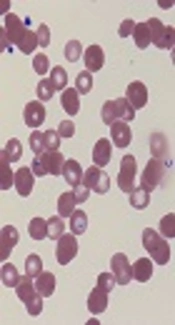Azithromycin is antibacterial drug that is prescribed for a wide range of mild to moderate infections caused by bacteria, such as acute bacterial sinusitis in adult, acute exacerbations of chronic bronchitis (AECB), urethritis and cervicitis in adults, skin and soft tissue infections in adults, genital ulcer diseases in men, pharyngitis or tonsillitis, Trachoma, community-acquired pneumonia, and acute otitis media (1). In addition, after allogeneic hematopoietic stem cell transplant (HSCT), bronchiolitis oblitrans syndrome (BOS), with high morbidity and mortality, is common, and, according to the previous study, it seems that azithromycin could reduce post- lung transplant BOS (2). The increased rate of relapse of hematological malignancies in HSCT patients can be treated with Azithromycin (3). A clinical trial, which investigated long term Azithromycin exposure to prevent BOS in patients who underwent allogeneic HSCT for hematological malignancy, was terminated early after an increased risk of relapse was seen in patients taking azithromycin compared with placebo (4).
Although it is not clear how azithromycin could be contributed to the observed higher rate of hematological relapse, in the study, it is concluded that long-term azithromycin exposure following HSCT may include risks that exceeds the anticipated benefits. In a randomized placebo controlled study, in France, which c conducted in 19 academic transplant centers, patients aged 16 and older undergoing HSCT due to hematologic malignancy were investigated. A total of 480 patients were suited and 243 of them received 250mg three times a week for two years and 237 patient received placebos for 2 years, similar to the sample study group. The study was terminated 13 months after recruitment, and according to the available data, the survival rate for two years was 57% in azithromycin treated patients and 70% in placebo patients. Finally, it is concluded that early administration of azithromycin as prophylaxis in patients undergoing HSCT for hematological malignancy than placebo could lead to worse airflow decline free survival (4).
Analysis of relevant out there knowledge doesn't counsel this risk to use to alternative patient populations or to approved indications in brief and long run use. However, despite of other supportive data, an exact potential mechanism remains unidentified. Therefore, this study shows that long term azithromycin exposure subsequent to HSCT may be associated with an increased relapse risk of hematological malignancies. Possible risks that exceed the anticipated benefits could associate with the long-term azithromycin exposure following HSCT (3, 4).
In recent years, due to the development of bone marrow transplant wards and performing allogeneic bone marrow transplant in Iran incidence of BOS is inevitable. Therefore, the Infectious Diseases Specialist should be aware of relevant complication of long-term use of azithromycin and with logical administration of medication and prevent possible complication in patients.
